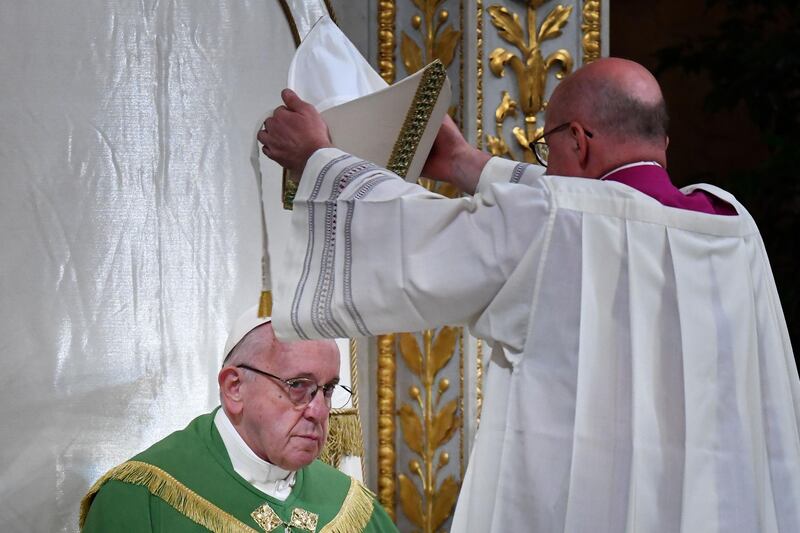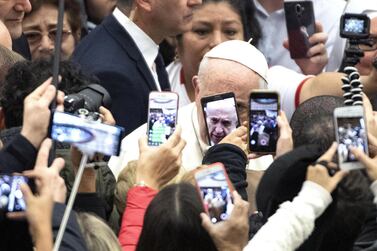An institution with roots that stretch back 2,000 years, the Roman Catholic Church is in a watershed era as it faces the internal challenge of reform and external pressures of deepening global divisions.
Vatican observers see the major themes of Pope Francis's tenure as his outreach to Islam, an appeal for social justice and the need to tackle abuse allegations as he overhauls the Church's hierarchy.
The pontiff’s visit to the UAE is a symbolically significant act of outreach to a substantial slice of the global population.
In travelling to the Arabian Peninsula, Pope Francis is playing to the strengths of his papacy.
From the start, Pope Francis struck a starkly different pose when addressing relations with Islamic institutions and beliefs. Whereas Pope Benedict XVI, the Pope Emeritus, stoked dark fears, Pope Francis has made openness and mutual understanding his hallmark.
Pope Francis had a chance to make his mark almost as soon as he ascended to the papal throne, as Europe opened its borders to the millions of refugees fleeing the Syrian civil war and the rise of ISIS in the region.
At a time when fear of the other ignited a rise in nationalist politics, Pope Francis stood for welcoming the newcomers and called for refugees to be accommodated as equals, with human dignity at the forefront.
In two new documents on migration and human trafficking, the Vatican has emphasized the need to protect migrants and step up international collaboration and prosecutions of traffickers. https://t.co/XOw6NT6utU
— Crux (@Crux) January 17, 2019
By backing the Catholic institutions that were offering help to those seeking new lives, he took risks to ensure that the Vatican’s message of compassion was heard. “In some respects the migrant crisis in Europe at that time put him at odds with the populist movements and governments that were emerging,” said David Gibson, director of the Centre for Religion and Culture at Fordham University, New York.
“He’s been misrepresented as having a position of ‘open all the borders and let everyone come in’ but instead what he stands for is a radical openness and of the idea of welcoming all the people who do come.”
The power of the migrant issue to change Europe is now well recognised. From the outset, Pope Francis set his own agenda. For Mr Gibson the pontiff is a reformist force not seen for decades.
“That really is his fundamental contribution – picking up on the promises of opening up the Church to the world that were seen in the 1960s,” said Mr Gibson.
“Not to go back to them but also not to try to recover a lost Christendom or revive an old Catholic culture or institutions.
"Pope Francis is about trying to meet people where they are in life and to engage with different ways of being. He has charted a new course." The man born Jorge Mario Bergoglio has addressed the issues of inequality, climate change and poverty.
At a time when populist politics are on the rise, not only in Europe and America but also left-leaning bastions such as Brazil, Pope Francis provides a sympathetic voice not always heard from the Vatican.
"The Pope's messages have been very important, particularly in his rejection of the nationalist politics that preys on people's fears," said one veteran Vatican observer.
“And as we will see in the trip to the UAE, he has prioritised issues like the protection of Christians in the Middle East and with his travels demonstrates his wish to learn from and grow relations with Islam.
“He’s going to Morocco in March and has been to Jordan and Egypt.”
Faced with a body of ageing priests and dwindling congregations, Pope Francis is thought by some to be contemplating radical steps, including the introduction of women deacons.
He follows a style of leadership in which the deliberative skills of discernment are summarised in three stages: see, judge and act.
"[Francis] does not see himself as the chief executive of the Catholic Church," said Thomas Reese, an American priest and author. "He has a great respect for collegiality, the belief that the Pope should not act like an absolute monarch.
“At his first synod of bishops, he encouraged the bishops to speak boldly and not be afraid to disagree with him.”







